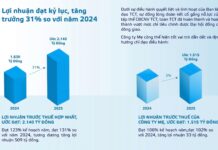Today, August 1st, Dan Viet Newspaper hosted a panel discussion titled “New Opportunities in the Real Estate Market.” The event coincided with the enforcement of three crucial laws directly impacting the real estate market: the 2024 Land Law, the 2023 Housing Law, and the 2023 Real Estate Business Law.

The panel discussion, “New Opportunities in the Real Estate Market,” was organized by the Rural Newspaper/Electronic Dan Viet.
In recent years, as the real estate market showed signs of stagnation, with limited new product supply, rising land prices, reduced capital inflow, and sluggish liquidity, experts concurred that approximately 70% of the market’s challenges stemmed from legal issues and 30% from capital difficulties.
Numerous projects encountered obstacles in fulfilling their financial obligations. Elaborating on this issue, Mr. Dao Trung Chinh, Director of the Planning and Land Development Department of the Ministry of Natural Resources and Environment, attributed it to the application of laws enacted in 1993 rather than those from 2013. Even with the 2013 Law, many localities failed to implement it effectively, leading to numerous violations in land valuation, creating a fear of making mistakes and paralysis in decision-making.
Firstly, the 2024 Land Law addresses issues arising from governmental mechanisms rather than developers’ faults. Secondly, the Law clearly distinguishes between cases where the state revokes land and those where enterprises must act independently. Thirdly, it introduces transparency regarding auction, bidding, and self-implementation procedures.
Additionally, the Law covers business operations involving land exploitation, project transfers, and solutions for overseas Vietnamese with Vietnamese citizenship interested in purchasing property. It also provides guidelines for situations involving domestic and foreign investors.
With the early enforcement of these three laws, Mr. Chinh anticipates resolving the current challenges in the real estate market, particularly those related to land valuation and financial obligations.
However, Mr. Le Van Binh, Deputy Director of the Land Department of the Ministry of Natural Resources and Environment, offered a different perspective. He attributed most project delays to procedural errors rather than legal hurdles.
Despite legal provisions, many projects fail to follow the established sequence, leading to frequent mistakes. Previously, the valuation timing was determined by the land lease decision, but there was no specified timeframe for issuing the land price decision, causing delays. The 2024 Land Law addresses this issue by introducing valuation flexibility.
The early implementation of these three laws, five months ahead of schedule, is advantageous for the real estate sector. It enhances transparency in land access for investors, providing clear mechanisms and streamlining legal procedures for investors and residents.
Naturally, the Laws primarily address land pricing and compensation for resettlement. While previous regulations specified concrete prices, they often fell short of market values. The new provisions continue to use specific prices but gradually align with market rates, ensuring better compensation for those whose land is expropriated. Furthermore, the Laws provide more detailed classifications of land types.







































